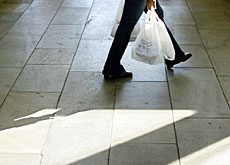Swiss put Sunday shopping on their list

An unusual coalition of lobby groups is challenging a parliamentary decision to ease restrictions on Sunday retail trading in Switzerland.
But voters are set to deal the trade unions, churches and consumer groups a blow at the ballot box on Sunday, according to opinion polls.
Shops in Switzerland usually remain closed on Sundays and public holidays, leaving many foreign visitors and locals bemused.
But numerous exceptions to the labour law have been granted in the past few years, particularly in tourist areas, at service stations and increasingly at the country’s main airports and railway stations.
Last year parliament approved amended labour legislation aimed at easing Switzerland’s comparatively strict rules, bringing them into line with the latest commercial trends.
However, the trade unions, the main churches and consumer groups joined forces to fight the relaxed regulations. They are concerned that it will lead to a seven-day working week.
“We have to prevent Sunday work from snowballing,” said Paul Rechsteiner, president of the Federation of Trade Unions, Switzerland’s biggest labour movement.
Holy Sundays
The unions argue that work-free Sundays were a major historical achievement in the late 19th century for workers and that extending Sunday trading would result in deteriorating working conditions for low-paid employees.
The unions have the support not only of the centre-left Social Democratic Party and the Greens, but also of church groups, consumer organisations and small shopkeepers who are concerned they cannot compete with big retailers.
“The ban on Sunday work gives churches a space of their own,” said Pierre Bürcher of the Catholic Bishop’s Conference.
His view is echoed by the president of the Federation of Protestant Churches, Thomas Wipf.
“If people have to work on Sunday, our society will lose its warmth and it would be the first step towards abolishing Sunday’s special status.”
In Britain, Sunday trading has been permitted under the law for ten years. A British commentator on religious affairs told swissinfo it had not had much impact on church attendance there.
“Church attendance has declined over the past decade but that has been part of a long-term decline and I don’t think that Sunday trading has played a particularly crucial role in that,” said Felix Corley.
“Maintaining a day of rest on a Sunday or any other day is probably a losing battle, and many churches in Britain have stepped back from this debate.”
Consumer need
The government, three of the four main political parties – the centre-right Christian Democrats and Radicals as well as the rightwing People’s Party – and the Swiss Business Federation, have all come out in favour of easing restrictions.
“Shopping in large railway stations and a number of airports meets a need among the public,” said Economics Minister Joseph Deiss.
The government also said that public transport as well as the economy would benefit from the relaxed rules.
The federal authorities say up to 150 shops that already open on Sundays would have to close or reduce their selection of goods on offer if the amended labour law was voted down.
About 2,000 jobs would be affected by the decision, according to experts.
There are about 360,000 people working on Sundays in other sectors, including hospitals, transport and hotels.
International trend
Switzerland’s rules on Sunday trading are rather restrictive compared with other industrialised countries.
A report commissioned by the State Secretariat for Economic Affairs found that there has been a trend towards an extension of opening hours in most European countries over the past few years.
The Swiss appear to approve an easing of shopping restrictions. The final gfs opinion poll ahead of the vote gave supporters a 14 per cent lead over their opponents.
In September voters in canton Aargau decided to lift regional trading restrictions in line with regulations in several other regions of the country.
swissinfo, Urs Geiser
In Switzerland Sunday work was banned in principle under 19th–century labour legislation.
Shopping hours are decided at the cantonal or local level. Some regions have lifted restrictions or have granted special Sunday licences.
About 360,000 people (10% of the workforce) work on Sundays – mainly in hospitals, transport and tourism.
In 1996 voters overwhelmingly rejected a parlaimentary decision to ease restrictions on Sunday work.
Parliament wants to ease rules on Sunday trading at major railway stations and airports with annual sales of more than SFr20 million ($15.5 million).
Trade unions, churches, consumer groups and shopkeepers have forced a nationwide vote, warning relaxed rules will lead to a seven-day working week.
The issue will be put to a nationwide vote on November 27 alongside a proposal to introduce a five-year ban on genetically modified products in agriculture.

In compliance with the JTI standards
More: SWI swissinfo.ch certified by the Journalism Trust Initiative












You can find an overview of ongoing debates with our journalists here . Please join us!
If you want to start a conversation about a topic raised in this article or want to report factual errors, email us at english@swissinfo.ch.